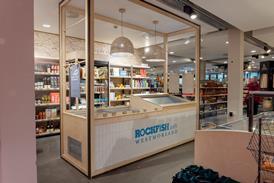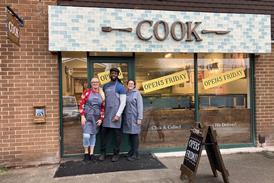Close menu
- Home
- Buying & Supplying
- Stores
- Channels
- Finance
- People
- Reports
-
Events
- Back to parent navigation item
- Events
- The Grocer Gold Awards
- LIVE: Retail Week x The Grocer
- The Grocer New Product & Packaging Awards
- The Convenience Awards
- The Convenience Conference
- Rethinking Materials
- Food & Drink Expo
- Farm Shop & Deli Product Awards
- Farm Shop & Deli Retailer Awards
- The Omnichannel Conference
- Jobs
- Subscribe now
- Previous slide
- 1 of 1
- Next slide
| Healthcare and supplements value sales | ||
|---|---|---|
| Top eight vitamins | ||
| Value (m) | % change | |
| Adult multivitamins | 118.0 | -2.7% |
| Children's multivitamins | 60.7 | 9.7% |
| Glucosamine | 38.7 | 4.6% |
| Cod Liver Oil | 35.7 | -4.6% |
| Minerals | 32.5 | 9.4% |
| Vitamin C | 27.1 | -8.4% |
| Herbal supplements | 26.7 | -5.4% |
| Pregnancy multivitamins | 18.4 | -19.6% |
| Three fastest growing retailers | ||
| % change | ||
| Bargain stores | 28.9% | |
| Morrisons | 8.5% | |
| Sainsbury's | 5.1% | |
| Source: Kantar, 52 w/e 27 January 2019 | ||
| Value (m) | % change | |
| Adult Multivitamins | 118.0 | -2.7% |
| Other Supplements | 63.3 | 17.1% |
| Childrens Multivitamins | 60.7 | 9.7% |
| Glucosamine | 38.7 | 4.6% |
| Cod Liver Oil | 35.7 | -4.6% |
| Mineral | 32.5 | 9.4% |
| Vitamin C | 27.1 | -8.4% |
| Herbal Supplements | 26.7 | -5.4% |
| Other Fish Oils | 20.9 | -19.4% |
| Pregnancy Multivitamins | 18.4 | -19.6% |
| 50 Plus Multivitamins | 14.3 | -1.5% |
| GLA | 11.9 | -4.8% |
| Vitamin D | 11.3 | 3.4% |
| Vitamin B | 10.9 | 21.7% |
| Garlic | 4.4 | -9.6% |
| Vitamin E | 2.1 | -12% |
| Royal Jelly | 0.1 | 144.2% |
| Vitamin A | 0.0 | -84.8% |
| Retailer | Value share | % change |
| Tesco | 18.8 | -2.3% |
| Asda | 5 | -6.1% |
| Sainsbury's | 6.6 | 5.1% |
| Morrisons | 2.2 | 8.5% |
| Co-operative | 0.2 | -49.9% |
| Waitrose | 1.1 | -34.9% |
| Discounters | 2.1 | 4.0% |
| Boots | 37.5 | 0.5% |
| Independent Pharmacies | 1.1 | -10.1% |
| Superdrug | 3.7 | 3.6% |
| Lloydspharmacy | 0.8 | -22.2% |
| Bargain Stores | 3.9 | 28.9% |
| Holland & Barrett | 11.2 | -0.3% |
| Wilkinson | 2.2 | 1.6% |
| Savers | 0.5 | -6.0% |
With all the hoopla over health and wellbeing right now, you’d be forgiven for thinking sales of vitamins and minerals would be in rude health. Not so.
“The market has stagnated this year, with 0.3% value growth compared with 5.5 % the previous year,” says Kantar analyst Hanna Ulstein.
The two key drivers of this stagnation are falling volume sales and fewer numbers of households buying into the category.
Ulstein suggests growing awareness of the need for a balanced diet could be behind the drop in penetration for the category, which is being driven by the core female demographic.
Average prices have increased as brands have grown share. “Private label is in overall decline,” adds Ulstein. “Despite this, Boots brands experienced 14% growth.”
Kantar’s Worldpanel FMCG service monitors consumer behaviour across Great Britain. Its primary panel tracks take-home purchases of 30,000 demographically representative households. Data on consumption habits, nutrition and out of home sales is collected through subsidiary panels. Visit kantarworldpanel.com for details


